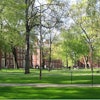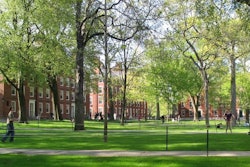When reflecting on his Division I college basketball career at Marquette University, Jamil Stamschror-Lott has his pick of rosy memories, from coming out victorious over Duke University to beating UConn, which was ranked 2nd in the nation at the time. But one memory stands out among the rest. It was when Adrienne Ridgeway, Marquette’s current executive associate athletic director, told him he was qualified to be more than a basketball player.
“She sat down with me and showed me many employment opportunities that I did not even know existed at the time,” Stamschror-Lott told Marquette University last winter. “She said, ‘Not only are you qualified, you are overqualified for these positions.’ … I did not sense a feeling of judgment for exploring this decision. In those spaces, many times it feels taboo to discuss doing anything outside of basketball.”
Today Stamschror-Lott is a mental health provider running his own therapy practice, Creative Kuponya, which he and his wife Sara founded together in 2017. The practice — named after the Swahili word for “healing” — is based in Minneapolis, the city he moved to as a child in the ’90s. That was back when the city was still being dubbed as “Murderapolis,” he says.
“Having new encounters, like drive-by shooting drills in elementary school, and seeing poverty and folks eating out of garbage cans was extremely bizarre,” says Stamschror-Lott. “… I always knew I wanted to help. I liked the idea of superheroes and I always knew I wanted to do good by others, but I just wasn’t sure in what form.”
Later in his college years, his sociology classes helped him understand his past experiences.
“It spoke to my experience of having been othered or having been treated differently because I was Black,” says Stamschror-Lott, who often felt isolated as one of the few Black students in his advanced placement courses in high school. “It helped answer questions like, ‘Why does it seem [Black people] always get the short end of the stick?’”
Interested in social work, he began working for Big Brothers Big Sisters as an outreach worker to youth while in Milwaukee. Upon graduation, he returned to the Twin Cities where he found work as a case manager at a halfway house for adult males who had just left the prison system and were struggling to adapt to regular life. The combination of those two experiences, he says, emphasized the importance of reaching people early.














